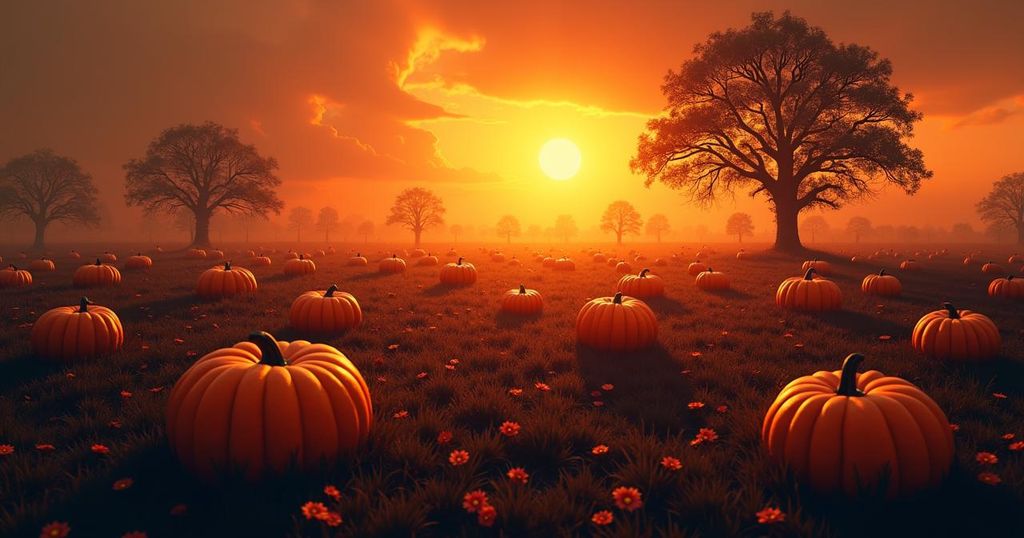Climate Change Disrupts Halloween Festivities as Pumpkin Farmers Face Crop Failures

As Halloween draws near, UK pumpkin farmers report severe crop failures due to extreme weather. Heavy rains and slugs have drastically reduced yields, with some farmers like Jonathan Hewitt experiencing up to 90% crop failure. Forecasts indicate one of the worst harvests in history, exacerbated by contrasting conditions over the past two years. The quality and size of pumpkins have diminished, impacting those relying on them for seasonal festivities. Calls for better preparedness against climate-induced weather extremes are being emphasized by agricultural advocates.
As Halloween approaches, pumpkin farmers in the UK are grappling with severe crop failures attributed to extreme weather patterns. Record levels of rainfall, coupled with a significant increase in slug populations, have adversely affected crop yields. Jonathan Hewitt, a farmer with a 10-acre pumpkin patch on the Dunham Massey estate in Altrincham, reported a staggering 90% failure rate in his crops, describing this year as the most disastrous in his extensive experience. He stated, “In all my years, this was absolutely the worst one for pumpkins.” Similarly, Joe Hamer, a fifth-generation farmer from Shrewsbury, noted that while some pumpkins are ready for picking, only 60-80% of pick-your-own patches across the nation are operational this season. This weather turmoil has been compounded by a record-setting winter of 2023/24 in England and Wales, which has resulted in the wettest climatic conditions observed since records began in 1836. As a consequence, forecasts suggest that England may face one of its most abysmal harvests in history. Farmers, like Chad Stevens from Horncastle Farm near Wakefield, have witnessed stark fluctuations in weather, with last year’s yield compromised by drought and this year’s burdened by excessive moisture. Mr. Stevens indicated a notable discrepancy in size, with his largest pumpkins this year not exceeding eight inches, a significant reduction compared to the usual dimensions of 12-14 inches in previous harvests. Additionally, professional pumpkin carver Jamie Jones expressed his dismay over the substandard quality of the harvest, stating, “I honestly feel like crying,” as he struggles with smaller pumpkins that are more difficult to carve. In light of these challenges, Roger Harding, Director of Round Our Way, underscored the urgent need for policymakers to equip the UK for the unpredictable weather patterns driven by climate change, emphasizing that even fluctuations in pumpkin harvests can have substantial effects on agriculture and food pricing.
The climate crisis has precipitated an escalation in extreme weather events, affecting agricultural yields across the globe. In the UK, pumpkin farmers are particularly vulnerable to these fluctuations, as their crop cycles are sensitive to changes in weather conditions, including rainfall patterns and temperature shifts. The significance of the pumpkin crop extends beyond mere agriculture; it is intertwined with cultural traditions and festivities such as Halloween. Amidst increasing precipitation and environmental unpredictability, there is a growing concern for the future viability of such fundamental agricultural practices.
In summary, the impact of climate change on agricultural practices is becoming increasingly evident, as demonstrated by the significant crop failures experienced by UK pumpkin farmers this Halloween season. With heavy rainfall and a surge in pests contributing to an unprecedented decline in pumpkin yield, farmers are facing both immediate economic hardships and long-term viability challenges. The necessity for strategic political action to mitigate the effects of climate change on agriculture has never been more critical as farmers plead for collective measures to adapt to these challenging circumstances.
Original Source: www.independent.co.uk







